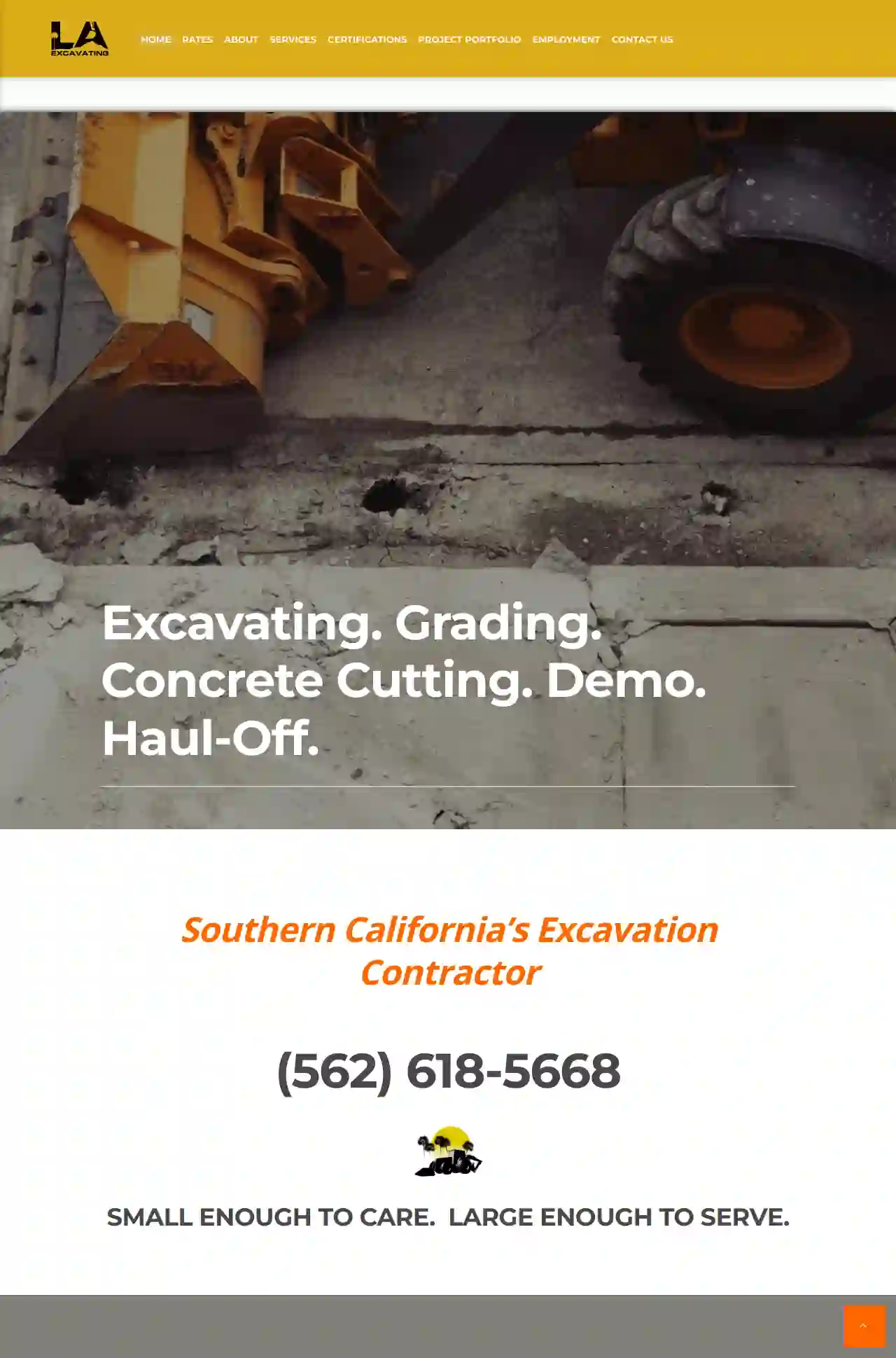Dirt Contractors Long Beach
Find the best Dirt Removal in Long Beach
Receive up to 3 Dirt Contractors quotes for your project today! Compare profiles, reviews, accreditations, portfolio, etc... and choose the best service.

LA Excavating, Inc.
11 reviewsLong Beach, USLA Excavating LA Excavating is a Southern California excavation contractor specializing in a wide range of services, including excavating, grading, concrete cutting, demolition, and haul-off. We are committed to providing our clients with high-quality services at competitive prices. Our team of experienced professionals is dedicated to safety and customer satisfaction. We are proud to serve the Southern California community. We are small enough to care and large enough to serve. We are committed to providing our clients with the highest quality services at competitive prices. Our team of experienced professionals is dedicated to safety and customer satisfaction. We are proud to serve the Southern California community.
- Services
- Why Us?
- Gallery
Get Quote
Over 3,943+ Excavation Contractors on our directory
Our excavation contractors operate in Long Beach and beyond!
ExcavationHQ has curated and vetted the Best Excavation Contractors arround Long Beach. Find a top & trustworthy pro today.
Frequently Asked Questions About Dirt Contractors
- Designated Disposal Facilities: Contact your local waste management authority or search online for designated dirt and debris disposal facilities in your area. They accept various types of soil and construction materials.
- Recycling Centers: Some recycling centers accept clean fill dirt, concrete, or brick for reuse in other construction projects.
- Donation: If the dirt is clean and suitable for gardening or landscaping, consider donating it to community gardens, schools, or neighbors with landscaping projects.
- Erosion Control: Berms can intercept and slow down runoff, preventing soil erosion and sedimentation.
- Noise Reduction: Berms can act as noise barriers, reducing noise pollution from traffic, construction, or industrial activities.
- Visual Screening: Berms can block unsightly views, create privacy, or define property boundaries.
- Security: Berms can serve as security barriers, deterring unauthorized access or vehicle intrusion.
- Landscaping: Berms can enhance landscaping by creating elevation changes, providing planting areas, or defining garden beds.
- **Good Drainage:** Allows excess water to drain away, preventing waterlogging and root rot.
- **Adequate Aeration:** Provides sufficient air pockets for root respiration.
- **Nutrient Retention:** Holds onto essential nutrients for plant uptake.
- **Easy to Work With:** Not too heavy or too light, making it manageable for digging and planting.
What is the best way to dispose of excess dirt?
What is a dirt berm, and what are its uses?
How much dirt do I need for my project?
1. **Measure the area:** Determine the length, width, and depth (in feet) of the area where you need dirt.
2. **Calculate the volume:** Multiply the length x width x depth to get the volume in cubic feet.
3. **Convert to cubic yards:** Divide the cubic feet volume by 27 (there are 27 cubic feet in one cubic yard).
**Example:**
If your area is 10 feet long x 5 feet wide x 2 feet deep, the volume would be: 10 x 5 x 2 = 100 cubic feet
To convert to cubic yards: 100 / 27 = 3.7 cubic yards (round up to 4 cubic yards to ensure you have enough).
It's advisable to consult with a dirt contractor or landscaper for more accurate calculations, especially for complex projects or irregular-shaped areas.
What is the best type of dirt for my garden?
What is the best way to dispose of excess dirt?
- Designated Disposal Facilities: Contact your local waste management authority or search online for designated dirt and debris disposal facilities in your area. They accept various types of soil and construction materials.
- Recycling Centers: Some recycling centers accept clean fill dirt, concrete, or brick for reuse in other construction projects.
- Donation: If the dirt is clean and suitable for gardening or landscaping, consider donating it to community gardens, schools, or neighbors with landscaping projects.
What is a dirt berm, and what are its uses?
- Erosion Control: Berms can intercept and slow down runoff, preventing soil erosion and sedimentation.
- Noise Reduction: Berms can act as noise barriers, reducing noise pollution from traffic, construction, or industrial activities.
- Visual Screening: Berms can block unsightly views, create privacy, or define property boundaries.
- Security: Berms can serve as security barriers, deterring unauthorized access or vehicle intrusion.
- Landscaping: Berms can enhance landscaping by creating elevation changes, providing planting areas, or defining garden beds.
How much dirt do I need for my project?
1. **Measure the area:** Determine the length, width, and depth (in feet) of the area where you need dirt.
2. **Calculate the volume:** Multiply the length x width x depth to get the volume in cubic feet.
3. **Convert to cubic yards:** Divide the cubic feet volume by 27 (there are 27 cubic feet in one cubic yard).
**Example:**
If your area is 10 feet long x 5 feet wide x 2 feet deep, the volume would be: 10 x 5 x 2 = 100 cubic feet
To convert to cubic yards: 100 / 27 = 3.7 cubic yards (round up to 4 cubic yards to ensure you have enough).
It's advisable to consult with a dirt contractor or landscaper for more accurate calculations, especially for complex projects or irregular-shaped areas.
What is the best type of dirt for my garden?
- **Good Drainage:** Allows excess water to drain away, preventing waterlogging and root rot.
- **Adequate Aeration:** Provides sufficient air pockets for root respiration.
- **Nutrient Retention:** Holds onto essential nutrients for plant uptake.
- **Easy to Work With:** Not too heavy or too light, making it manageable for digging and planting.